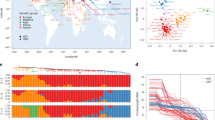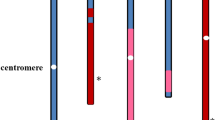Abstract
THE anormalis factor (Am Am) of Coffea arabica affects the size of the plant, its branching habit and its leaves, flowers, fruits and seeds. The internodes of the branches are shorter than in the typica variety, taken as standard. The leaves are extremely abnormal, often almost palmate and of various sizes. The corolla has a variable number of lobes, the stamens are almost normal, but the style and stigma are very reduced and misshaped. The number of flowers and fruits is normal. The seeds have a slightly corrugated surface. A rather high percentage of loeules contains more than one ovule. The anormalis shows incomplete dominance in F 1.
This is a preview of subscription content, access via your institution
Access options
Subscribe to this journal
Receive 51 print issues and online access
$199.00 per year
only $3.90 per issue
Buy this article
- Purchase on Springer Link
- Instant access to full article PDF
Prices may be subject to local taxes which are calculated during checkout
Similar content being viewed by others
Author information
Authors and Affiliations
Rights and permissions
About this article
Cite this article
CARVALHO, A. Linkage in Coffea arabica . Nature 189, 685–686 (1961). https://doi.org/10.1038/189685b0
Issue Date:
DOI: https://doi.org/10.1038/189685b0
This article is cited by
-
Effect of exogenous RNA isolated from bones and embryonic tissues on growth of sarcoma M1
Bulletin of Experimental Biology and Medicine (1970)
Comments
By submitting a comment you agree to abide by our Terms and Community Guidelines. If you find something abusive or that does not comply with our terms or guidelines please flag it as inappropriate.



